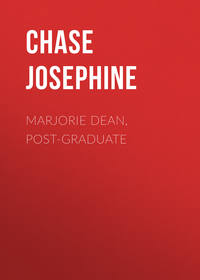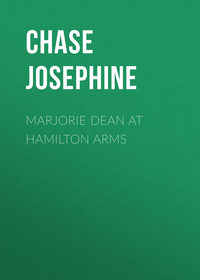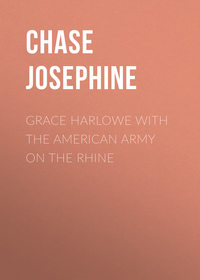 полная версия
полная версияMarjorie Dean, High School Sophomore
For a moment Marjorie stood watching her through the half-drawn portieres. She would have liked to continue the conversation, but pride forbade her to do so. Mary's mood presaged rebuff. Later, at luncheon, she unbent sufficiently to question Marjorie further regarding the try-out. Although she did not say so, she was sorry that Mignon had been given a principal's part in the operetta. Privately, she wished she had made an attempt to get into the chorus. She, too, was of the opinion that the French girl would bear watching. Failure to carry off the highest honors would act as a spur to Mignon's unscrupulous nature, and sooner or later some one would pay for her defeat.
Mary was quite correct in her conjecture that Mignon would not allow matters to rest as they were. From the moment that Constance had been announced as the Princess she had made a vow that by either fair or unfair means she would supplant "that white-faced cat of a Stevens girl," who had been awarded the honor that should have been hers. The first step consisted in holding a private session with Professor Harmon after the others had gone, to ascertain if by any chance he might be relied upon to help her. She found him engaged in conversation with the dark young man. He eyed her with interest, bowed affably when presented to her by the professor, and expressed somewhat profuse pleasure at meeting her. In the presence of a stranger, Mignon dared not ask Professor Harmon openly to reconsider his recent decision in her favor. Three minutes' conversation with him showed her that, had she made the request, it would have availed her nothing. The brisk little man's mind was made up. He congratulated her on capturing second honors with a finality that could not be assailed. Then a brilliant idea entered her wily brain.
"Professor Harmon," she began, with a pretty show of girlish confusion, quite foreign to her usual bold method of reaching out for whatever she coveted, "I would like to ask you if I might understudy the Princess. Of course, I know that I can't sing as Miss Stevens sings, and I wouldn't for the world wish anything to happen to prevent her from singing on the great night, but I am so fond of music that it would be a pleasure to understudy the rôle. I shouldn't like anyone to know that I was doing so, though. It is just a fancy on my part."
"Certainly you may, Miss La Salle," was the professor's hearty response. "Your idea is excellent. It is a mistake, even in an amateur production, not to provide an understudy for an important rôle, such as Miss Stevens will sing. I must provide an understudy for Mr. Macy, and others of the cast, also. But you are too modest in your request that no one else must know. I am sure Mr. Armitage will be pleased with your suggestion."
"Oh, please don't tell him!" exclaimed Mignon. A shade of alarm crossed her dark face, which was not lost on the professor's companion, Ronald Atwell. A mere acquaintance of Professor Harmon's, he had lately arrived in Sanford, at the close of a season as leading man in a popular musical comedy, to visit a cousin. Brought up in that hard school of experience, the stage, he was an adept at reading signs, and he was by no means deceived as to the true character of the girl who stood before him. Far from being displeased with his deductions, he became mildly interested in her and mentally characterized her as being worth cultivating. He had watched her during the try-out, and he had glimpsed her true self in the varying expressions that animated her dark face. He had attended the try-out on the polite invitation of Professor Harmon, and at the latter's earnest solicitation had agreed to take charge of the stage direction of the operetta. The professor had congratulated himself on obtaining such valuable assistance, while the actor looked upon the affair as a pastime which would serve to lighten his stay with his rather dull cousin. He had come to Sanford for a period of relaxation before going to New York to begin rehearsals with a summer show, and the prospect of directing the operetta promised to be amusing.
"Very well, I will say nothing," promised the professor amiably. He had come to the try-out, hoping to see the daughter of his friend capture the rôle of the Princess, but the enthusiasm of the artist had driven that hope from his mind when he had heard Constance sing. Now he dwelt only on the success of the operetta, and was distinctly relieved to find that Mignon was in an amiable frame of mind over the unexpected change in his plans. Knowing her tempestuous disposition, he decided that it would be policy to humor her whim.
"Thank you so much," beamed Mignon. "I must go now. Good-bye."
"I find I must leave you, also," said Ronald Atwell, glancing at his watch, "or I shall be late for luncheon."
Mignon had already walked toward the east door of the gymnasium. With a hurried "Good-bye, Professor. I will be here for rehearsal on Tuesday," the dark, young man strode after Mignon and overtook her in the corridor.
"I wonder if our ways lie in the same direction," he said pleasantly. "I am the guest of Mr. and Mrs. Horton. Mr. Horton is a cousin of mine."
"I pass their house on my way home," was the prompt reply.
Elated at receiving the marked attention of this distinguished stranger, Mignon exerted herself to the utmost to be agreeable during their walk. From the few words she had heard pass between the professor and Mr. Atwell as she approached them, she had gathered the information that the latter was to manage the stage and coach the actors in the operetta. She determined that, if it were possible, she would enlist his services in her behalf. She had counted on Professor Harmon, and he had failed her. In this good-looking, affable young man she foresaw a valuable ally. The presentation of "The Rebellious Princess" was still four weeks distant. A great many things might happen in that time.
Her companion's suave comment, "I think Professor Harmon made a mistake in assigning the Princess to the young woman who sang last," uttered with just the exact shade of regret, caused Mignon to thrill with new hope. Mr. Atwell, at least, was of the same mind as herself. She brightened visibly when he went on to say that as stage manager he would try to give her every advantage that lay in his power. "I am certain that you have within you the possibilities which go to make a great actress, Miss La Salle," was his parting remark to her, and these flattering words, which were, in reality, merely idle on the part of the actor, she accepted as gospel truth. It was always very easy for her to accept that which she wished to believe, for self-analysis was not one of her strong points.
When the cast and chorus for the operetta met in the gymnasium the following Tuesday afternoon, it did not take the lynx-eyed feminine contingent long to discover that Mignon La Salle had a friend at court. Laurie Armitage, also, soon became aware of the fact. He was secretly displeased that Mignon had been chosen to sing in his operetta, and almost on first acquaintance he had formed a dislike for Ronald Atwell. Behind his polished manners he read insincerity, and he was sorry that Professor Harmon had asked this newcomer to assist in managing the production. But, manlike, he kept his prejudice to himself, admitting reluctantly that Atwell seemed to know what he was about.
In the frequent rehearsals that followed, however, many irritating incidents occurred to try his boyish soul. Most of all he disapproved of the actor manager's brusque manner toward Constance Stevens. He found fault continually with her in the matter of the speaking of her lines, and developed a habit of rehearsing her over and over again in a single scene until she was ready to cry of sheer humiliation at her own failure to please him. More than once Laurie made private protest to Professor Harmon, but the latter invariably reminded him that despite Miss Stevens' beautiful voice, she was far from grasping the principles of acting, and that Mr. Atwell was a striking example of a conscientious director.
Lawrence Armitage was not the only one whose resentment against the too conscientious stage manager had been aroused. His unfair attitude toward Constance was the subject of many indignant discussions on the part of the girls who comprised her coterie of intimate friends.
"It's a shame," burst forth Jerry Macy in an undertone to Marjorie, as they stood together at one side of the gymnasium and watched the impatient manner in which the actor ordered their idol about. "I wouldn't stand it, if I were Connie. I guess you know who is to blame for it, don't you?"
Marjorie nodded. A faint touch of scorn curved her red lips. Mignon's growing friendship with Ronald Atwell was the talk of the cast. He frequently accompanied her home from school, invited her to Sargent's, and it was rumored that he was often a guest at dinner or luncheon at her home. Proud of the fact that his daughter was to sing an important rôle in "young Armitage's opera," Mr. La Salle had treated his daughter's new acquaintance with considerable deference and allowed Mignon to do as she pleased in the matter of entertaining him.
"Laurie told Hal that he was sorry Professor Harmon had asked that old crank to help. Laurie didn't say 'old crank,' but I say it, and I mean it," continued Jerry vindictively. "Don't breathe it to anyone, though. It was a brotherly confidence and Hal would rave if he knew I repeated it."
"Jerry," whispered Marjorie. Her brief scorn had faded into a faint frown of anxiety. "I don't think Mr. Atwell is really the best sort of person for Mignon to go around with. He is ever so much older than she and, somehow, he doesn't seem sincere. Someone told Muriel that he told Mignon she would make a wonderful actress. Mignon was boasting of it. Suppose she were to get an idea of going on the stage. She is so headstrong she might run away from home and do that very thing if she happened to feel like it. I don't like her, but I can't help being just a little bit sorry for her. You know, she hasn't any mother to help her and love her and advise her. Her father is so busy making money, he doesn't pay much attention to her. Fathers are splendid, but mothers are simply splendiferous. I don't know what I'd do without my Captain." Marjorie sighed in sweet sympathy for all the motherless girls in the universe.
"Mothers are a grand institution," agreed Jerry, looking a trifle solemn. "I think mine is just about right. I never thought of Mignon in that way before. Now, I suppose I'll have to be sorry for her, too. She doesn't look as though she needed much sympathy just now. She's so pleased with the way Connie is being ordered about that she can't see straight. There, he's through with the poor child at last. Come on. It's time for the chorus to perform. Try to imagine that this good old gym is the king's palace and that our mutual friend the Crane is a kingly king. He looks more like a clothes-pole!"
Marjorie was forced to laugh at Jerry's uncomplimentary comparison. They had no further opportunity for conversation in the busy hour that followed. Professor Harmon drilled them rigidly, his short hair positively standing erect with energy, and they were quite ready to gather their little band together and hurry off to Sargent's for rest and ice cream when the rehearsal was at last over.
"See here, Connie, why don't you tell that Atwell man to mind his own business," sputtered Jerry as the six girls walked down the street in the direction of their favorite haunt.
"He is minding his business," returned Constance ruefully. Her small face was very pale and her blue eyes were strained and unhappy. "It is my fault. But he makes me nervous, and then I can't act. When I am at home I can say my lines just as I ought, but the minute he begins to tell me what to do, everything goes wrong. Then he finds fault and almost makes me cry. I wish I hadn't tried for a part. If it weren't so late I'd resign from the cast."
"And let Mignon sing the Princess!" came from Muriel in deep disgust.
"Don't you do it," advised Susan. "That's precisely what she'd like you to do."
"It's a plot between Mignon and Mr. Snapwell – I mean Atwell," declared Jerry. "She's crazy to be the Princess and he is trying to help her along. A blind man could see that."
"I think so, too," said Irma Linton slowly. "You must try not to mind him, Connie, then you won't be nervous."
"Why don't you ask Laurie to interfere?" proposed Jerry. "He looked crosser than I look when I'm mad when that Atwell man was worrying you about your lines this afternoon. I'll ask him myself, if you say so."
"No." Constance shook her head. "I wouldn't for the world complain to Laurie. He has enough to think of now, without bothering his head over my troubles. I suppose I am too easily hurt. I must learn not to mind such things, if ever I expect to become a real artist."
"That's the way you ought to feel, Connie," put in Marjorie's soft voice. She had been thinking seriously, while the others talked, as to what she might say to cheer up her disconsolate schoolmate. "You were chosen to sing the part of the Princess, and I am sure no one else can sing it half so well. Try to think that, all the time you are rehearsing. Remember, Laurie believes in you, and so do we. When the great night comes you won't have to listen to that horrid Mr. Atwell's nagging, or say your lines over and over again. You will truly be the Princess, and that will make you forget everything else. If you believe in yourself, nothing can make you fail. For your own sake, don't think for a minute of giving up the part."
CHAPTER XXVI
MAKING RESTITUTION
Greatly to Mr. Ronald Atwell's chagrin, Constance Stevens began suddenly to show a marked improvement in her work that did not in the least coincide with his plans. Influenced by Mignon's tale of her wrongs, laid principally at Constance's door, albeit Marjorie, too, came in for her share of blame, he had taken a dislike to the gentle girl and lost no opportunity to humiliate her. Privately, he regarded the entire cast, Mignon included, as a set of silly children, and his only regard for Mignon lay in a wholesome respect for her father's money. At heart he was not a scoundrel, he was merely vain and selfish, and imbued with a profound sense of his own importance. It had pleased his fancy to assume the charge of the staging of the operetta, but now he was growing rather tired of it and wished that it were over.
Long before this he and Mignon had come to a definite understanding regarding the operetta. Mignon had informed him boldly that she wished to sing the part of the Princess, and he had assured her that he would arrange matters to her satisfaction. It, therefore, became incumbent upon him to keep his word. He had begun his persistent annoying of Constance, convinced that, unable to endure it, she would resign and leave the field of honor free to the French girl. But Constance did nothing of the sort. She stood her ground, half-heartedly at first, but afterward, with Marjorie's words ringing in her ears, she exhibited a steadiness of purpose that he could not shake.
At the dress rehearsal, the last before the public performance, she was a brilliant success, compelling even his reluctant admiration. It was now too late even to consider the possibility of Mignon replacing her, and he informed the latter rather sheepishly of this, as he rode home with her in her electric runabout.
For the first and last time he had the pleasure of seeing Mignon in a royal rage, and when they reached her home, he declined her sullen offer to send him home in her automobile, and made his escape with due speed. Deciding he had had enough of amateurs and amateur operettas, he mailed a note to Professor Harmon excusing himself from further service on the plea of a telegram summoning him to New York. Whether the telegram were a myth, history does not record. Sufficient to say that he actually went to New York the following afternoon. And thus "The Rebellious Princess" lost a stage manager and Mignon the hitherto chief factor in her plans. She was also the recipient of an apologetic note from the actor, which caused her to clench her hands in rage, then shrug her thin shoulders with a gesture that did not spell defeat. Somehow, in some way, she would accomplish her purpose. Even at the eleventh hour she would not acknowledge herself beaten. Yet as the day wore on toward evening she could think of nothing to do that would bring her her unreasonable desire.
The operetta was to be sung in the Sanford Theatre, where the dress rehearsal had been held. Furious almost to tears at her inability to bring about the impossible, Mignon at last ordered her runabout and made sulky preparations to start for the theatre. The possession of an automobile gave her the advantage of being able to don her first act costume at home, but her really attractive appearance in the fanciful gown of the heartless step-sister afforded her no pleasure. She hooked it up pettishly, made a face at herself in the mirror of her dressing table, and, drawing her evening cloak about her, flounced downstairs to her runabout, completely out of humor with the world in general.
She drove along recklessly, as was her custom, and when half way to the theatre narrowly missed running down a small, sturdy figure that was marching across the street.
"Naughty old wagon," screamed a familiar voice after her.
At sound of that piping voice, Mignon stopped her car and peered out. Trotting along the sidewalk a little to her rear was a small boy with a diminutive violin case tucked under his arm. Little Charlie Stevens had come forth once more to see the world. In a flash wicked inspiration came to Mignon. The Stevens child was running away again, but this time he had chosen an evening exactly to her liking. Slipping out of her car she ran toward the boy. "Why, good evening, little boy," she called pleasantly. "Where are you going?"
"I know you. You're a naughty girl!" observed Charlie with more truth than courtesy. He braced himself defiantly and regarded Mignon with patent disapproval.
"I am so sorry you think so." Mignon affected a sadness which she was far from feeling at this unvarnished statement. "I was going to take you for a ride and buy you some ice cream."
Charlie considered this astonishing offer in silence. He stared frowningly at Mignon. "Is it chok'lit ice cream?" he asked, eyeing her in open disbelief.
"Of course it is. As much as you can eat."
"All right. I want some. But you're a naughty girl, just the same. Mary said so."
Mignon shrugged indifferently. She was not greatly concerned at either his or Mary's opinion of her. "Come on, if you want a ride," she urged.
Charlie obeyed with some show of reluctance. He was not sure that even the prospect of ice cream warranted his surrender. Mignon caught him up and swung him into the runabout. Her wrist watch pointed to fifteen minutes past seven. She had no time to lose. She drove rapidly through the town to a small confectioner's store at the other end. Charlie kept up a lively chatter as they rolled along. Stopping before it she lifted the boy from the automobile, and, taking his hand, hurried him into the brightly lighted store. Seating him at a table, she ordered two plates of chocolate ice cream and sat down opposite the boy, her black eyes glittering as she watched him eat. From time to time she glanced at her watch. When the child had finished his plate of cream, she pushed her own toward him. "Eat it," she commanded.
Charlie responded nobly to the command. When she saw the last spoonful vanish, she smiled elfishly. It was eight o'clock. The operetta began at half past eight. Allowing herself fifteen minutes to reach the theatre and carry out the last step in her plan, she would arrive there at fifteen minutes past eight.
The wandering musician made strenuous objection, however, to leaving the ice cream parlor. "I could eat more chok'lit cream," he informed her.
"You are a greedy boy," she said, her former friendliness vanishing into angry impatience. "Come with me this minute."
"You're a cross old elefunt," was Charlie's crushing but inappropriate retort.
Mignon was in no mood for an exchange of pleasantries. Seizing Charlie by the arm she hustled him out of the shop into her runabout, and was off like the wind. When half way between the shop and the theatre, she halted her car. Lifting the boy out she set him on the sidewalk before he had time to protest. "Now go where you please. I'll tell Connie to come and find you," was her malicious farewell. Stepping into the runabout she drove away, leaving Charlie Stevens to take care of himself as best he might.
Although Mignon was unaware of the fact, there had been an amazed witness to the final scene in her little drama. A fair-haired girl had come up just in time to hear her heartless speech and see her drive away, leaving a small, perplexed youngster on the sidewalk. That girl was Mary Raymond. She had steadily refused Marjorie's earnest plea that she attend the much-talked-of performance of "The Rebellious Princess," and directly after dinner that evening, on the plea of mailing a letter, had slipped from the house on one of her melancholy, soul-searching walks which she had become so fond of taking. Convinced that she was an utter failure, imbued with a daily growing sense of her own unfitness to be the friend of a girl like Marjorie Dean, Mary was plunged into the depths of humiliation and unhappiness. This alone had been the cause of the marked change in her that Marjorie had innocently attributed to Mignon's defection. In her sad little soul there was now no bitterness against Constance Stevens. Quite by chance she had one day not long past encountered Jerry Macy in Sargent's, alone. Touched by her woe-begone air, Jerry had taken pains to draw her out. With her usual shrewdness the stout girl had discovered the real cause of Mary's depression, and kindly advised her to have a heart-to-heart talk with Marjorie. Jerry had also made it a point to inform Mary, so far as she knew the details, of the trouble over the butterfly pins during Marjorie's freshman year, and of Mignon's cruel treatment of Constance. Distinctly to Jerry's credit, she told no one afterward of that chance meeting, yet she secretly hoped that what she had said would have its effect upon Mary.
Overwhelmed with shame, Mary had left the talkative, stout girl and dragged herself home, in an agony of humiliation that can be better imagined than described. She felt that she could never forgive herself for the ignoble thoughts she had harbored against innocent Constance Stevens, and she was still more certain that she could never ask either Marjorie or Constance to forgive her. Again and again she had tried to bring herself to approach Marjorie and humbly sue for pardon. The weight of her own troubled conscience prevented her from yielding, and thus she kept her sorrow locked in her aching heart and waited dejectedly for the day when she must leave the Deans' pleasant home, taking with her nothing but bitter self-reproach for her own folly.
It was in this black mood that Mary had wandered forth that evening and straight into the path of the very thing that was destined to bring her peace. Mignon had hardly driven away when Mary caught the venturesome youngster in her arms. The boy gave a jubilant little shout as he saw who held him. Mary, however, was still at a loss regarding the meaning of what she had seen.
"Every time the cross girl scolds Charlie, you come and get him," was the joyful exclamation. "She wasn't cross all the time. She gave Charlie a ride and lots of ice cream. Then she wented away. She said she'd tell Connie to come and find me. Connie's gone to the the'tre. I wented, too, but the naughty girl got Charlie."
"Charlie boy, try to tell Mary, where was he when the cross girl got him?"
"Way over there." Charlie waved an indefinite hand in the wrong direction.
Mary stood still, in a perplexed endeavor to read meaning in the nature of Mignon's strange action. Suddenly the light burst upon her. "Oh!" she cried, dismay written on every feature. "Now I begin to understand!" She glanced wildly about her. Far up the street shone the light of an oncoming street-car. Seizing Charlie by the hand she hurried him to the corner. It was not more than two minutes until the car came to a creaking stop before them. Mary helped Charlie into it and fumbled in her purse. She had just two nickels. Breathing her relief, she paid the fares, deposited Charlie on a seat beside her, then stared out the window in an anxious watch of the streets.









